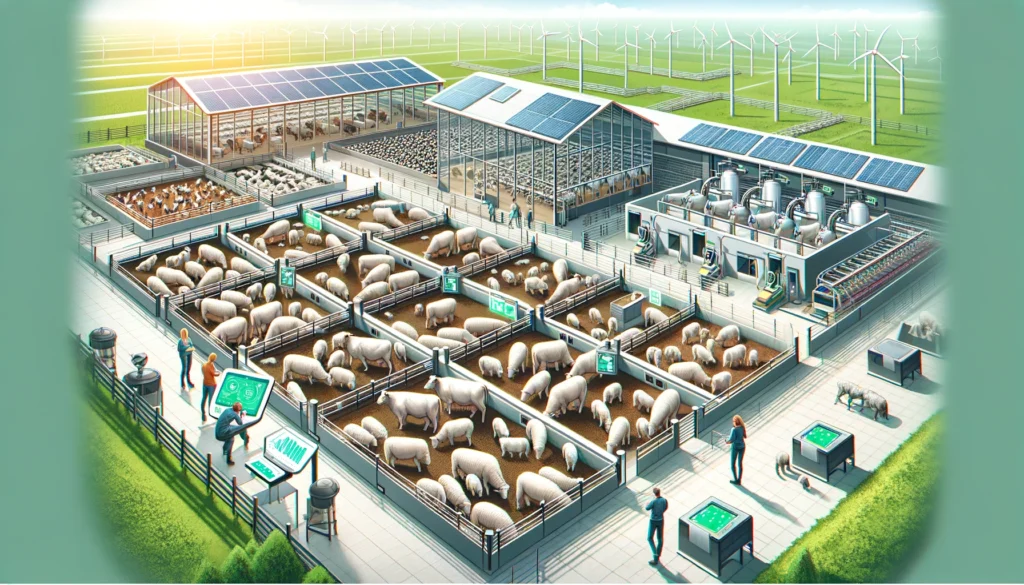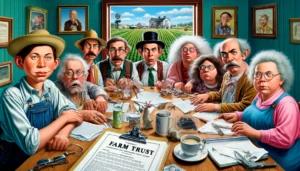
Livestock Management A wide aspect illustration of modern livestock management. The scene shows a large well organized farm with various types of livestock including cows.webp.webp
Livestock Management: Ensuring Health and Welfare in Animal Husbandry
Definition:
Livestock management refers to the holistic care and supervision of domesticated animals raised for various purposes, including food production, fiber, labor, and companionship. It involves a range of practices and techniques aimed at ensuring the health, well-being, and productivity of livestock while promoting sustainable and humane farming practices.
Informative Details:
Livestock management encompasses a diverse array of species, including cattle, sheep, goats, pigs, poultry, and others, each with unique needs and requirements. Effective livestock management involves providing animals with adequate nutrition, housing, healthcare, and environmental conditions to meet their physiological, behavioral, and social needs while minimizing stress, disease, and negative environmental impacts.
Fall off the barn roof and busted your keister? Life on the farm or ranch can be tough on the bum. Need a break? Laugh it off at FarmerCowboy.com, the #1 farm humor site. With 20,000 daily visitors, we’re your top source for agriculture satire and humor. Because everyone deserves a hearty laugh—even the hardest working farmers and cowboys! Join us and turn those long days into fun tales at FarmerCowboy.com.
Valuable Assistance:
Proper livestock management is essential for farmers, ranchers, and animal caregivers to maintain healthy and productive animal populations and ensure the sustainability and profitability of their operations. By implementing sound management practices and adhering to animal welfare standards and regulations, livestock producers can enhance the quality of life for their animals, improve product quality and safety, and maintain public trust in the agricultural industry.
Beneficial Guidance:
Livestock producers can benefit from a variety of resources, training programs, and expert advice available to support effective livestock management practices. From agricultural extension services and veterinary consultations to industry associations and educational materials, there are numerous opportunities for livestock producers to learn about best management practices, emerging technologies, and regulatory requirements related to animal care and welfare.
Actionable Suggestions:
- Animal Nutrition: Provide livestock with balanced diets tailored to their species, age, reproductive status, and production goals. Ensure access to clean water, quality forage, and supplemental feed sources to meet animals’ nutritional requirements and promote optimal growth, reproduction, and performance.
- Housing and Facilities: Design and maintain appropriate housing and facilities for livestock that offer protection from adverse weather conditions, predators, and disease transmission. Provide adequate space, ventilation, bedding, and sanitation to promote animal comfort, health, and well-being.
- Healthcare Management: Implement preventive healthcare measures, such as vaccination programs, parasite control, and routine health monitoring, to prevent diseases and minimize the need for therapeutic interventions. Develop relationships with veterinary professionals and seek timely veterinary care for sick or injured animals.
- Behavioral Management: Manage livestock behavior and social dynamics to minimize stress, aggression, and harmful behaviors. Provide opportunities for social interaction, environmental enrichment, and exercise to promote natural behaviors and mental stimulation.
- Environmental Stewardship: Practice sustainable land management and conservation practices to minimize environmental degradation and protect natural resources. Implement rotational grazing, manure management, and water conservation strategies to minimize the environmental footprint of livestock production and enhance ecosystem health.
Helpful Content for Livestock Producers:
Livestock management plays a critical role in ensuring the health, welfare, and productivity of animals raised for food, fiber, and other purposes. By adopting best management practices, embracing innovation, and prioritizing animal welfare, livestock producers can create sustainable and humane farming systems that benefit animals, farmers, consumers, and the environment.
References:
- American Association of Bovine Practitioners – Link
- American Association of Small Ruminant Practitioners – Link
- Food and Agriculture Organization of the United Nations (FAO) – Link
Originally posted 2019-09-05 14:47:02.
Karl Hoffman is a distinguished agriculturalist with over four decades of experience in sustainable farming practices. He holds a Ph.D. in Agronomy from Cornell University and has made significant contributions as a professor at Iowa State University. Hoffman’s groundbreaking research on integrated pest management and soil health has revolutionized modern agriculture. As a respected farm journalist, his column “Field Notes with Karl Hoffman” and his blog “The Modern Farmer” provide insightful, practical advice to a global audience. Hoffman’s work with the USDA and the United Nations FAO has enhanced food security worldwide. His awards include the USDA’s Distinguished Service Award and the World Food Prize, reflecting his profound impact on agriculture and sustainability.



